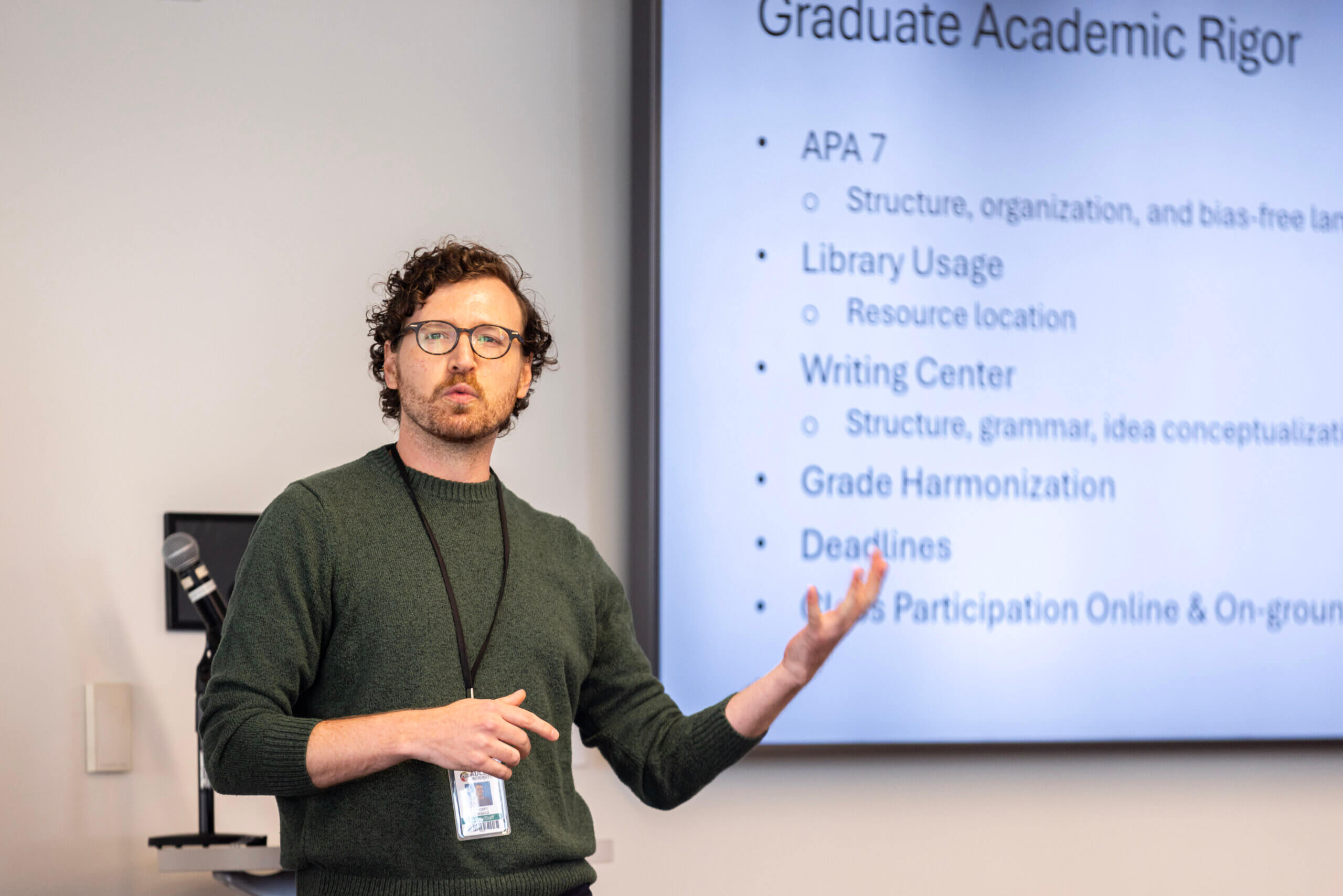Program mission
The mission of the Doctor of Philosophy in Counselor Education and Supervision (DCES) is to provide advanced training and education for practicing counselors to achieve advanced professional and personal development in becoming scholars, counselor educators, supervisors, leaders, and advocates in the field of counseling. The clinical and academic focus is on freedom and liberation rather than mere adjustment and adaptation for clients. It furthers the mission of Adler University through the infusion and understanding of the themes of social justice, diversity, multiculturalism, empowerment, oppression, freedom, and liberation, and emphasizes scholarship and socially responsible practice.
Program objectives
The DCES Program is designed to:
- Provide students with a learning environment and curriculum to develop their counselor educator identity and competencies through research, practice, teaching, supervision, and leadership and advocacy.
- Develop competent researchers and scholars to generate new knowledge to inform evidence-based counseling practices and train new counselors.
- Enable students to develop professional portfolios and expertise to enhance their career goals and paths.
- Systemically and regularly collect program feedback input from key stakeholders, including program core faculty, current students and alumni, site supervisors, external counselor educators, and dissertation committee members for program evaluation and modification.
- Develop socially responsible educators and practitioners who adhere to professional and ethical standards and program dispositions in order to function as effective supervisors and gatekeepers for the profession.
- Ensure students’ attainment of program learning outcomes.
Objective 1: Professional Identity
Demonstrate an in-depth understanding and identification of the various roles of counselor educators in the training and supervision of counselors, teaching, advancing the standards, knowledge, and skills based on the profession of counseling, research and scholarly work, advocating for the welfare of those whom they serve, and advocating for and leadership within the profession.
Objective 2: Supervision
Demonstrate a conceptual understanding of and ability to apply various theories and models in the supervision of counselors with reference to the characteristics of the counselor supervisees, clinical settings, and relevant therapeutic issues.
Objective 3: Clinical Practice
Demonstrate the ability to apply, evaluate, and integrate theories from both individual and systems perspectives in the provision of interventions in different practice areas in counseling and in serving diverse populations.
Objective 4: Teaching
Demonstrate competencies in applying teaching strategies, instructional theories, and evaluative measures in the development of curriculum and teaching modules pertaining to counselor education and the training of counselors.
Objective 5: Research
Demonstrate an in-depth understanding and ability to design and implement sound scholarly research from both quantitative and qualitative paradigms and methodologies. This involves displaying an awareness and understanding of the importance of research and the ability to conceive of research as a researcher. An additional ability is to have the capability to ask proper research questions that lead to proper research designs capable of producing substantial scholarly contributions to the profession.
Objective 6: Multicultural and Social Justice Competency
Demonstrate an advanced understanding of social change theories and a keen awareness of social justice issues and their respective causes from social, cultural, and systemic perspectives.
Objective 7: Leadership and Advocacy
Demonstrate an in-depth understanding of the role of counselor educators in social changes and advancement of the counseling profession, and ability to utilize leadership and advocacy models in order to initiate changes with reference to topical and political conditions.
Objective 8: Assessment and Evaluation
Demonstrate a high level of awareness and aptitude in assessment and evaluation as well as evidence-informed practices in areas of counseling, teaching, supervision, advocacy, and program development.
Objective 9: Adlerian Principles and Practice
Integrate Adlerian principles and counseling approach in areas of counseling, teaching, supervision, and advocacy.
Objective 10: Professional Practice and Ethics
Demonstrate a commitment to socially responsible practice and adherence to ethical standards established by the profession and to regulations set up by local, regional, and national authorities.
Objective 11: Multicultural and Social Justice Counseling
Demonstrate multicultural competencies in all aspects of practice as a counselor educator, with advanced understanding of the impact and management of diverse factors in the preparation of counselors, provision of treatment and intervention for clients, promotion of client welfare, development of programs and services, observation of ethical and legal standards, and initiation of social change through political venues and strategies.
Objective 12: Scholarship
Forms an identity and function of that of a scholar capable of actively contributing to the knowledge base of the profession, as well as to the knowledge base of the mental health professions in general, through scholarly publications. This can be done conceptually through scholarly writing in the form of analysis of the literature, designing research-based models, or constructively writing articles analyzing the profession itself with the intention of improving it. This also involves not only the ability to conduct quantitative and qualitative research, but also the ability to logically conceive and put in writing both the results and the implications of those results in the venue of scholarly, peer-reviewed journal articles and books.
Student data
The following are the most recent program outcomes for the Ph.D. in counselor education and supervision program. On a regular basis, Adler University surveys students, graduates, site supervisors, and employers to obtain useful information about the program.
*Data is from the 2022-2023 academic year.
View previous annual reports
- 2021-22 Ph.D. in Counselor Education and Supervision Program Annual Report.
- 2019-20 Ph.D. in Counselor Education and Supervision Program Annual Report.
- 2017-18 Ph.D. in Counselor Education and Supervision Program Annual Report.
- 2016-17 Ph.D. in Counselor Education and Supervision Program Annual Report.
- 2015-16 Ph.D. in Counselor Education and Supervision Program Annual Report.
